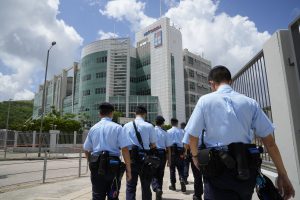Yesterday’s police raid on the Apple Daily newspaper is yet another blow to media freedom in Hong Kong – and the most severe yet. The arrest of five employees, including the editor Ryan Law and four senior executives, and the freezing of HK$18 million worth of assets, shows Beijing’s intent to kill off the last remaining significant pro-democracy voice in the city.
The raid by 500 police officers resulted in arrests under the city’s draconian national security law for “collusion with a foreign country or with external elements to endanger national security.” This is the first time journalists have been arrested under the national security law, which was imposed on Hong Kong by the Chinese Communist Party regime a year ago and has led to the dismantling of Hong Kong’s freedoms and democracy.
It is the second time in 10 months that the Apple Daily’s newsroom has been raided by police, and it follows the arrest and imprisonment of the newspaper’s proprietor Jimmy Lai, a pro-democracy entrepreneur, last August. Lai faces several charges and is awaiting trial under the national security law.
The Apple Daily is the only remaining Chinese-language mass circulation pro-democracy daily newspaper in Hong Kong, and the Chinese regime has been warning for some months that it will move against it. With the pro-democracy camp having been ejected from the city’s legislature last November, pro-democracy politicians arrested under the national security law earlier this year for having held primaries to choose their candidates for the next Legislative Council elections, and with almost all of Hong Kong’s prominent pro-democracy activists on trial, in prison or in exile, the Apple Daily had become Beijing’s next clear target in its assault on all forms of dissent in the city.
I worked as a journalist in Hong Kong for the first five years after the handover, from 1997 to 2002, and so am appalled by the attack on the free press. For the past year I have been writing a weekly column for the Apple Daily’s English language online section, and am constantly inspired by the courage and determination of their staff. As soon as I heard the news of the police raid I messaged a journalist to check if she was safe, and she replied with typical fortitude: “Thanks for asking. Many of us can work from home so we will try our best to keep business as usual.”
That extraordinary bravery deserves to be honored by the international community with action against those responsible for destroying Hong Kong’s freedoms. The United States, the United Kingdom, Canada, Australia, the European Union, Japan, and other democracies must demand the immediate release of all those arrested under the national security law, and apply punitive measures against officials responsible for targeting journalists. For countries that have not yet imposed Magnitsky sanctions, they should do so now – against Hong Kong’s Chief Executive Carrie Lam and other officials in the regimes in Hong Kong and Beijing. Targeted sanctions against enterprises and entities complicit with the Chinese Communist Party’s brutal repression should also be applied.
If Beijing is allowed to continue to tear up its promises under an international treaty – the Sino-British Joint Declaration – and destroy Hong Kong’s freedoms with impunity, it will not stop there. Taiwan is already in its sights, and the rest of the free world will be next. If the G-7’s pledge in Cornwall last weekend, to uphold the international rules-based system and defend Hong Kong’s promised rights and freedoms, is to mean anything, now is the time for concerted, coordinated action by the world’s democracies, to defend what remains of a free press in Hong Kong.
































